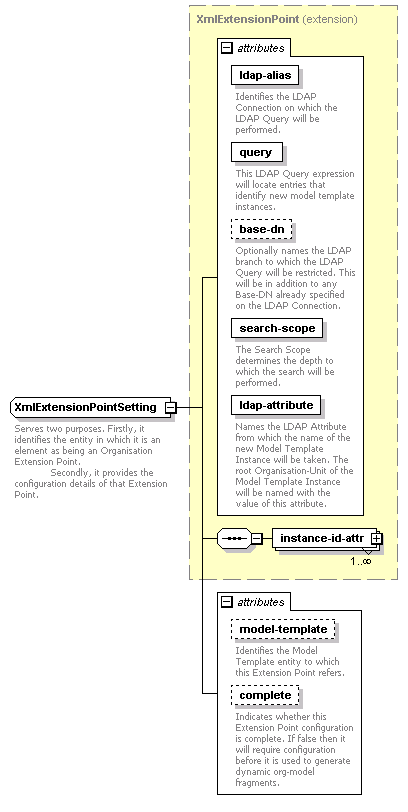| diagram |
 |
| namespace |
http://base.api.de.bpm.tibco.com |
| type |
extension of XmlExtensionPoint |
| properties |
|
| children |
instance-id-attr |
| used by |
| element | XmlOrgUnit/extension-point |
|
| attributes |
| Name | Type | Use | Default | Fixed | Annotation | | ldap-alias | xs:string | required | | | | documentation | | Identifies the LDAP Connection on which the LDAP Query will be performed. |
| | query | xs:string | required | | | | documentation | | This LDAP Query expression will locate entries that identify new model template instances. |
| | base-dn | xs:string | optional | | | | documentation | | Optionally names the LDAP branch to which the LDAP Query will be restricted. This will be in addition to any Base-DN already specified on the LDAP Connection. |
| | search-scope | XmlLdapSearchScope | required | | | | documentation | | The Search Scope determines the depth to which the search will be performed. |
| | ldap-attribute | xs:string | required | | | | documentation | | Names the LDAP Attribute from which the name of the new Model Template Instance will be taken. The root Organisation-Unit of the Model Template Instance will be named with the value of this attribute. |
| | model-template | xs:string | | | | | documentation | | Identifies the Model Template entity to which this Extension Point refers. |
| | complete | xs:boolean | | true | | | documentation | | Indicates whether this Extension Point configuration is complete. If false then it will require configuration before it is used to generate dynamic org-model fragments. |
|
|
| annotation |
| documentation | Serves two purposes. Firstly, it identifies the entity in which it is an element as being an Organisation Extension Point.
Secondly, it provides the configuration details of that Extension Point.
|
|
| source |
<xs:complexType name="XmlExtensionPointSetting">
<xs:annotation>
<xs:documentation>Serves two purposes. Firstly, it identifies the entity in which it is an element as being an Organisation Extension Point.
Secondly, it provides the configuration details of that Extension Point.
</xs:documentation>
</xs:annotation>
<xs:complexContent>
<xs:extension base="XmlExtensionPoint">
<xs:attribute name="model-template" type="xs:string">
<xs:annotation>
<xs:documentation>Identifies the Model Template entity to which this Extension Point refers.</xs:documentation>
</xs:annotation>
</xs:attribute>
<xs:attribute name="complete" type="xs:boolean" default="true">
<xs:annotation>
<xs:documentation>Indicates whether this Extension Point configuration is complete. If false then it will require configuration before it is used to generate dynamic org-model fragments.</xs:documentation>
</xs:annotation>
</xs:attribute>
</xs:extension>
</xs:complexContent>
</xs:complexType> |
